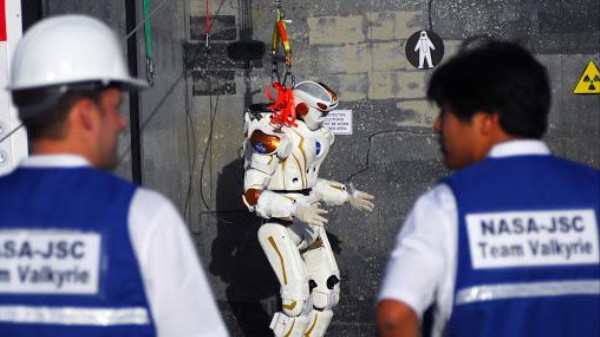The
Just this week, Stephen Hawking reiterated his belief that artificial intelligence will one day annihilate the human race. Elon Musk, the founder of Space X and Tesla Motors, has been busy spreading a similar message. Add Nick Bostrom, the author of Superintelligence and high priest of the killer robot crowd, to the mix and you’ve got a zeitgeist aching for everyone’s favourite homicidal android to return to the big screen, sawed-off shotgun in hand, one-liners cocked and ready.
In light of the Terminator franchise’s prescience—it seems like everybody’s got “SkyNet” on the tip of their tongue these days—we should take this opportunity to ask: how realistic is its vision of the future, anyhow? Are we really on our way to a Terminator-style situation, led by Google?
We called up Gregory Dudek—a roboticist who also happens to be the director of the McGill University School of Computer Science, the director of the Canadian Field Robotics Network, the founder of Independent Robotics, Inc.—to find out.
Motherboard: How likely is the version of the future presented in the trailer—one in which humanity is nearly annihilated by robots and artificial intelligence?
Gregory Dudek: Without dealing with the obvious fact that it’s an impossible question for anybody to really answer—it’s not my expectation. Artificial intelligence and robotics are going to make the world a lot better for us puny humans. I don’t see them taking over. I would be more worried about our cats and dogs taking over the world than our robots, at least for the foreseeable future.
MB: So you don’t think robots are going to kill us all—it’s more about how they’re going to change our everyday lives in ways both good and terrifying.
GD: Absolutely. Wouldn’t that just be a much easier way for them to take over the world, anyhow? They wouldn't have to fight us. They’d just have to love us to death.
MB: I don’t know if that would make for a great Terminator movie, though.
GD: That all depends on how they imagine the scenario of loving us to death. You could imagine the XXX version.
MB: You know, Stephen Hawking, Elon Musk, and Nick Bostrom would probably disagree with you on this.
GD: Yeah, well—I’m trying not to make an excessively dismissive comment—but some smart people are worried about where things are going to go. Big change is scary. I think it’s hard for anyone to call how this thing’s going to play out, and it’s not obvious that super brilliant physicists are any better than super brilliant computer scientists or politicians at guessing where society’s going to take this whole thing. Clearly, guys like Stephen Hawking are ridiculously smart. But just because you’re smart in a lot of things doesn’t mean you know everything.
MB: Soft robots are being developed at robotics labs across the world, why not a liquid robot? Is something like the T-1000 going to be possible in the future?
GD: Saying, “This will never happen,” is almost a guaranteed way to look silly eventually, but I really think robots made only out of liquid metal are not going to happen. They have to have energy, and power, and they have to have some way of moving themselves. One could imagine robots that will be made of little pieces and maybe—hypothetically, in some weird science fiction way—the parts that are liquid and could be propelled. But they’re almost certainly going to have some solid substrate, power sources, and things that hold them together in one piece.

I think one disappointing thing about the Terminator franchise is that I often feel as though it’s cooked up by people who have no background in science. In order to always up the ante and make the system more frightening and powerful, they go completely off the deep end until it’s not credible at all. Then, it’s just disappointing for people who’d really like to find it provocative, and stimulating, and scary.
MB: It’s interesting how the Terminator franchise has become a lightning rod for commentary on artificial intelligence research. In terms of public anxiety about AI, it’s like we’ve travelled back to the 80s, just like the original Terminator.
GD: Right. I thought the first Terminator movie was provocative, scary, and realistic enough to give me the heebie-jeebies. I don’t think that’s where we’re going to go, but at least all the pieces seem to fit together in that. You have to give the movie makers a bit of license, like letting them travel backwards in time, but in the end the whole thing came together like a really scary vision of the future. When you have robots made out of liquid metal, it just becomes silliness. I think, going back to that 1980s vision, besides the fact that they had a very successful movie star, they also had a very successful way to put together a story that was both credible and scary.
The audience’s notion of what’s credible isn’t perfectly matched with where the science is
MB: The generic Terminator robots themselves haven’t changed that much since the 80s. They’re still weirdly humanoid, with full mobility, but a little bit stiff. Are we any closer to designing a two-legged robot that can move like that?
GD: I think we’re getting pretty close to robots that can move really, really well. I think the robots that we can make today can move much less stiffly than the ones in the movies. I have a feeling that the ones in the movies tend to move in stiff, awkward ways, just to let the audience know what’s a robot and what isn’t. Also, because the audience’s notion of what’s credible isn’t perfectly matched with where the science is. So, they can apparently make up a liquid metal robot, which is crazy, but some people believe it, but these other robots still move kind of stiffly. If I was an evil SkyNet machine, and I could make liquid metal robots that had invisible energy sources, I guess I would turn them into ball bearings and make them fly through anybody they saw, and I wouldn’t need to bother with all these medieval javelins for arms.
MB: Given your feelings on the movie’s technology, are you going to see it?
GD:
















